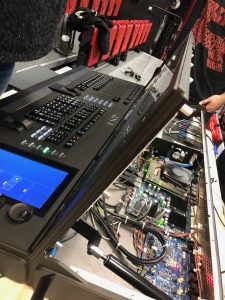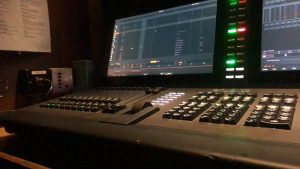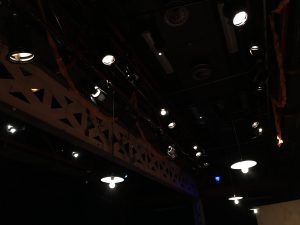And – it was fine. Having had almost every other fit up period of the past year in RCS fail to live up to expectations, though not through the fault of any particular person or group of people, this one was great. Every team worked well with each other, finding ways of working over and around one another that didn’t cause tension but instead made everyone more productive and faster at what they were trying to do. It felt like we’d all reached a point of trusting one another’s competency and ability to get the job done that no one felt the need to micromanage and could, instead, be productive in their own way to keep pushing the whole along. It was an amazing feeling and a great work environment – and within about two and a half days we had started focusing. This took longer than it likely should have done – however, with every dimmer in the room in use, there were a lot of lamps to deal with. One of our most productive sessions was an evening when Ben Terry and Fraser Walker were supervising the venue. Instead of sitting on their hands they joined Jazz in advising better ways of completing the task I was doing – be that a better way of focusing a fixture or changing lamps when they blew – along with focusing lamps themselves, and doing the perceivably boring jobs of walking the stage so I could get as much time up in the rig as possible. Like the fit up, this was just a really nice working environment to be a part of, and it once again made me feel like part of an electrics team rather than a Stage guy who is doing a turn as an electrician. It’s that continued support and respect that ran through this allocation and made it such a good one to be a part of.

Performing Minor Ti Surgery
Plotting turned into teching with as much refocusing as was to be expected in a show of this scale, and before we knew it we were into dress rehearsals. This was where the whole crew had a visible slow down. The energy and life that had been apparent up to that point was gone, replaced instead with the drudgery of running two shows days where there was very little to do. I tried to fill my time, getting an MA tutorial from Fraser whilst he was still in the building, which turned out to be a really interesting and useful way to spend three hours. To have the ability to ask really basic, beginner level questions of a guy who clearly lives and breathes the desk he was teaching me, was a really fun way of learning and I felt like I came out of the session far more confident about, not only the desk, but the specialism in general, than when I went in. Jazz was also kind enough to bring in his Titan Mobile and give us an Avolites tutorial, by which point I was getting a grasp of the kind of questions that were useful to ask during training sessions, and the scare factor posed by new lighting desks was beginning to lessen. Coming out of this allocation with a basic to working knowledge of three desks is a massive deal for me, and something I’m aware is rare for non-specialist lighting students in the Conservatoire. It’s definitely inspired me to read up and train myself more on these consoles, as it can never be bad to constantly be improving on every aspect of my technical theatre knowledge.

And then came operating. Karyn and I had reached a mutual agreement where – due to the rather simple nature of the show – we would split shifts between operating and down days. Having successfully ran a dress rehearsal, I ended up at the desk for the second show. And I made a mistake. A cue ended up going three seconds late once I’d seen and fixed my issue – but that wasn’t the point. I understand that we all screw up occasionally, that no one is perfect. But I know myself to be a hard taskmaster, and one who is hard on no one more than on myself. The explanation of what had actually happened – waking up a screen by tapping in the wrong place, selecting the wrong cue, not fully understanding what would then happen if I hit GO, getting it back to the cue we were in without follow-ons, and the DSM being in the wrong cue to start with – was very poorly explained by my tired and angry self when Karyn went on to, rightly, grill me on what had happened; with Jazz in his usual role as peacekeeper from the side. By letting ourselves all get to a point of boredom and drudgery, any slip up was blown out of all proportion – I know this because I did it to myself. I have reflected before in these journals about my shortcomings, and have tried to fix them as best I can when they affect my work. However, clearly I shouldn’t let my common sense get away from me when a problem presents itself, and should have known to have the sense to ask what I should have done in that situation. Relieving the burden I put on myself may solve many issues; and could result in the positive side effect of making me more pleasant for others to work alongside. The only silver lining to this instance being that the second show I opped – was clean.

Just So Many Lights
And then, as quickly as it had gone up, Balm was over. The first four hours of the strike were amazing, ripping out catwalks, cleaning, and restoring with the energy and drive that had been missing since the fit up. Soon, everything was out of the air, the walls were down, and the set on a van returning to Speirs. Karyn, myself, and Jazz had replaced the lamps on the par cans we had changed, and had cleaned all the gantry carpets, LX control, and all of the catwalk bars and grate floors. And then everything just slowed to a crawl. The concept of teams jumping on to assist other teams when they’ve finished their strike is a good one and exactly how shows in RCS should work; the LX team would have not been as efficient as we were during this strike had it not been for the two Sound guys working with us. But when there’s one team left in the space, and there’s no communication as to what is going on and no clear plan as to what should be happening, that is when people start getting agitated. The TSM strike involved a lot for this show – it was clear. Catwalk floors had to go back in, along with tab track sections, and kit had to be flow from the catwalks for a Sound event happening in the venue the week after. However, there was no clear plan for how any of this was to happen. What we ended up with, instead, was a team struggling to put tab track in due to lack of bodies, whilst catwalk floor was being carted onto the gantrys due to the fact it couldn’t actually be fitted in situ yet, whilst all the while truss was being assembled under the ground team’s feet. Eventually, Jazz took Karyn and I aside and advised we went home – an idea that we were more than happy to take on board.
This allocation turned out to be a great soother back into RCS after Summer. Taking everything I’d learned from working over June and July and applying it to an internal production context, overseen by external industry professionals as HODs, was a gift of an experience, as I feel I have gained a clear ability to complete LX crew jobs to a professional standard – something I had set myself as an intention to have achieved by the end of this allocation. Looking forward, this show has also taught me the importance of planning and communicating every stage of your process, as it will often result in a slower and more forced working environment if this is not done. Also, it has demonstrated to myself that if I want to work in environments to professional levels where people are told to their face exactly when and how they have made a mistake, I should stop feeling so attacked when it comes back to bite me upon my own errors.
SaveSave
SaveSave
SaveSave

